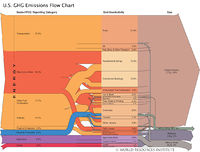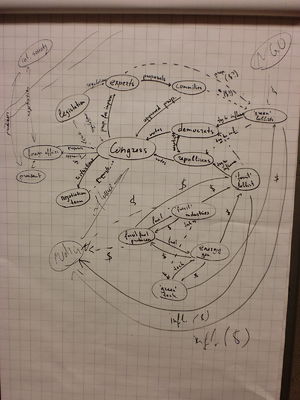Difference between revisions of "US"
| (13 intermediate revisions by the same user not shown) | |||
| Line 1: | Line 1: | ||
[[Position of US|US as driving force]] | [[Position of US|US as driving force]]<br> | ||
[[File:Us-flag.jpg|300px|right]] | |||
=Some facts= | |||
* Until 2006 U.S. was the largest carbon dioxide emitter. After 2006 was overcome by China. | * Until 2006 U.S. was the largest carbon dioxide emitter. After 2006 was overcome by China. | ||
* US GHG Emissions: | * During George W. Bush presidency it was claimed that signing Kyoto protocol will cost US economy $400B and 4.9M jobs. | ||
[[File:US-GHG-Emissions-BySector.jpg|200px | * US GHG Emissions:<br> | ||
[[File:US-GHG-Emissions-BySector.jpg|200px]]<br> | |||
* To ratify an international treaty 67 senator of 100 votes in favor are required. | * To ratify an international treaty 67 senator of 100 votes in favor are required. | ||
* [http://www.govtrack.us/congress/bill.xpd?bill=h111-2454 Waxman-Markey bill] plans to reduce American greenhouse gas emissions to 17% below 2005 levels by 2020, and to 83% below 2005 levels by 2050. 25% of the nations energy should be produced from the renewable sources by 2025. | * [http://www.govtrack.us/congress/bill.xpd?bill=h111-2454 Waxman-Markey bill] plans to reduce American greenhouse gas emissions to 17% below 2005 levels by 2020, and to 83% below 2005 levels by 2050. 25% of the nations energy should be produced from the renewable sources by 2025. | ||
* | * Negotiation team in Copenhagen was free to utilize the reduction goals in Waxman-Markey. | ||
* One of the major complaints of US in case of Kyoto Protocol and LCA are allowances for some developing countries such as China and India. | |||
=Effects of climate change on US= | |||
==Temperature increase== | |||
Right now part of the South experience 60 days with temperatures higher than 90 Degrees F (32.2 C). To the year 2100 it could increase to 150 days per year.<br> | |||
Since warmer weather evaporates more water into the atmosphere storms in the Northeast will become heavier (they already become 67 percent heavier since 1958) Around the Great Lakes, "lake effect" snowstorms could get heavier as ice recedes.<br> | |||
Higher temperatures could provide longer growing seasons for farmers but could also bring more pests. Also this will affect seasonal patterns that are very important for some crops. | |||
==Sea level increase== | |||
If sea level increase will be around 1m in a next 100 years, major part of South Florida will be flooded. | |||
= Mechanics within United States of America = | |||
[[File:Systems_US.JPG|300px|US]] | |||
=Reactions and politics= | |||
During last years US was preventing ratification of agreement in a any available way, however tried to push other countries to put some restrictions on their own emissions. Country's own economical prosperity is a main target. However after republicans lost a president's chair some light moves towards continuing negotiation appeared. Mainly because republicans seems to be much more influenced bu fossil fuels based industries.<br> | |||
Inside the country during last years it was a couple of proposals to reduce emissions, but almost all of them did not go through, except Waxman-Markey bill that was passed by the full house. However all those proposed reductions look like a joke compared to the restrictions incorporated into the Kyoto protocol and into the LCA draft. | |||
It seems to be almost impossible to pass any international regulation like LCA through congress, since 67 senators of 100 should vote in favor, and so far republicans ultimately were banning any climate change proposals. | |||
=Sources= | |||
http://www.usclimatenetwork.org/policy/copenhagen-climate-negotiations-briefing-book<br> | http://www.usclimatenetwork.org/policy/copenhagen-climate-negotiations-briefing-book<br> | ||
http://www.rff.org/wv/archive/2010/03/09/u-s-climate-policy-and-the-shape-of-international-agreements-part-3.aspx<br> | http://www.rff.org/wv/archive/2010/03/09/u-s-climate-policy-and-the-shape-of-international-agreements-part-3.aspx<br> | ||
http://www.govtrackinsider.com/articles/2010-04-27/climate-change<br> | http://www.govtrackinsider.com/articles/2010-04-27/climate-change<br> | ||
http://en.wikipedia.org/wiki/Greenhouse_gas_emissions_by_the_United_States#cite_note-Raupach-0 | http://en.wikipedia.org/wiki/Greenhouse_gas_emissions_by_the_United_States#cite_note-Raupach-0<br> | ||
http://www.helium.com/items/294938-the-case-against-the-kyoto-protocol | |||
http://www.washingtonpost.com/wp-dyn/content/article/2009/06/16/AR2009061601641.html | |||
http://www.globalchange.gov/ | |||
Latest revision as of 10:03, 10 September 2010
Some facts
- Until 2006 U.S. was the largest carbon dioxide emitter. After 2006 was overcome by China.
- During George W. Bush presidency it was claimed that signing Kyoto protocol will cost US economy $400B and 4.9M jobs.
- US GHG Emissions:
- To ratify an international treaty 67 senator of 100 votes in favor are required.
- Waxman-Markey bill plans to reduce American greenhouse gas emissions to 17% below 2005 levels by 2020, and to 83% below 2005 levels by 2050. 25% of the nations energy should be produced from the renewable sources by 2025.
- Negotiation team in Copenhagen was free to utilize the reduction goals in Waxman-Markey.
- One of the major complaints of US in case of Kyoto Protocol and LCA are allowances for some developing countries such as China and India.
Effects of climate change on US
Temperature increase
Right now part of the South experience 60 days with temperatures higher than 90 Degrees F (32.2 C). To the year 2100 it could increase to 150 days per year.
Since warmer weather evaporates more water into the atmosphere storms in the Northeast will become heavier (they already become 67 percent heavier since 1958) Around the Great Lakes, "lake effect" snowstorms could get heavier as ice recedes.
Higher temperatures could provide longer growing seasons for farmers but could also bring more pests. Also this will affect seasonal patterns that are very important for some crops.
Sea level increase
If sea level increase will be around 1m in a next 100 years, major part of South Florida will be flooded.
Mechanics within United States of America
Reactions and politics
During last years US was preventing ratification of agreement in a any available way, however tried to push other countries to put some restrictions on their own emissions. Country's own economical prosperity is a main target. However after republicans lost a president's chair some light moves towards continuing negotiation appeared. Mainly because republicans seems to be much more influenced bu fossil fuels based industries.
Inside the country during last years it was a couple of proposals to reduce emissions, but almost all of them did not go through, except Waxman-Markey bill that was passed by the full house. However all those proposed reductions look like a joke compared to the restrictions incorporated into the Kyoto protocol and into the LCA draft.
It seems to be almost impossible to pass any international regulation like LCA through congress, since 67 senators of 100 should vote in favor, and so far republicans ultimately were banning any climate change proposals.
Sources
http://www.usclimatenetwork.org/policy/copenhagen-climate-negotiations-briefing-book
http://www.rff.org/wv/archive/2010/03/09/u-s-climate-policy-and-the-shape-of-international-agreements-part-3.aspx
http://www.govtrackinsider.com/articles/2010-04-27/climate-change
http://en.wikipedia.org/wiki/Greenhouse_gas_emissions_by_the_United_States#cite_note-Raupach-0
http://www.helium.com/items/294938-the-case-against-the-kyoto-protocol
http://www.washingtonpost.com/wp-dyn/content/article/2009/06/16/AR2009061601641.html
http://www.globalchange.gov/


